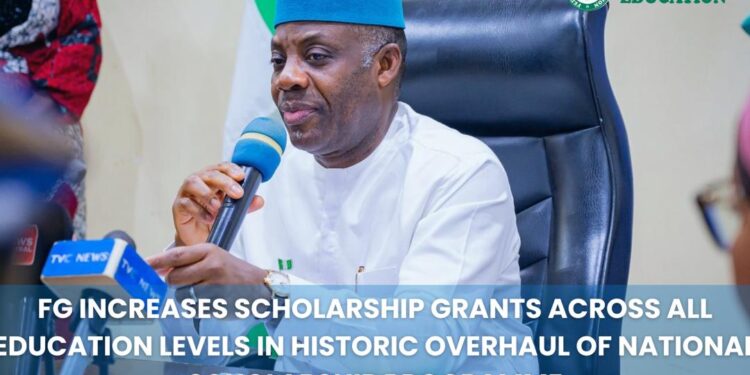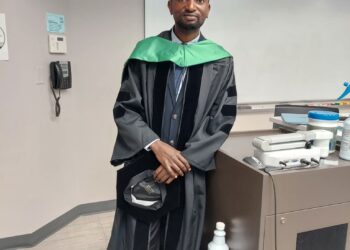In what is being described as the most sweeping reform of Nigeria’s national scholarship system in over ten years, the Federal Government has officially launched a historic upgrade to its education funding programme—offering more money, wider access, and stronger focus on national development goals.
At the heart of this transformation is a 50% increase in scholarship grants across all academic levels—from undergraduates to PhD candidates. The reform is part of the Renewed Hope Agenda of President Bola Ahmed Tinubu, and was formally announced by the Minister of Education, Dr. Maruf Olatunji Alausa CON, during a key meeting with the Federal Scholarship Board in Abuja.
So, what does this all mean for students, schools, and Nigeria’s future?
🔍 Bigger Scholarships, Broader Reach
Let’s break down the numbers:
Level Old Amount (₦) New Amount (₦)
PhD 500,000 750,000
Master’s 400,000 600,000
Undergraduate / HND / NCE 300,000 450,000
This raise is across all major national scholarship programmes, including the Nigerian Scholarship Award and the Education Bursary Award.
The aim? To help students cope with the rising cost of education and reduce dropouts due to financial constraints—especially as tuition and living costs continue to climb.
🎯 New Focus: STEMM, Vocational Skills, and Medical Fields
In a strategic shift, the government is directing more funds toward high-demand sectors critical to Nigeria’s economic growth. The scholarships are now targeted more deliberately at:
STEMM disciplines: Science, Technology, Engineering, Mathematics, and Medical Sciences
Vocational and technical training
Medical and allied health programmes
Two new scholarship categories have been introduced with ₦1 billion each:
1. STEM and Vocational Scholarships – for students in public polytechnics
2. Health Sciences Scholarships – for students studying Medicine, Nursing, Pharmacy, Dentistry, and Physiotherapy in public universities
These new categories are funded by reallocating money from the Bilateral Education Agreement (BEA) scholarship programme, which has been restructured. Current BEA awardees will continue to receive their funding, but new applications will now fall under this revamped scheme.
⚖ Who Gets What? A New Allocation Formula
To ensure a fairer and more impactful distribution of funds, a new formula has been introduced:
50% of scholarships go to undergraduates
25% to Master’s students
25% to PhD candidates
Within each academic tier:
70% of awards go to STEMM students
30% go to students in Social Sciences
And in a milestone move toward inclusivity, 5% of all scholarships are reserved for students with disabilities.
🏛 Transparency, Oversight, and Partnerships
To ensure the system runs fairly, a multi-agency Inter-Ministerial Committee—led by the Permanent Secretary of the Education Ministry—is overseeing implementation. Members include:
Representatives from the National Assembly
The Federal Character Commission
The Ministry of Women Affairs
And other key stakeholders
Their role is to ensure transparency, accountability, and that scholarships are awarded in line with national equity goals.
📈 The Big Picture: Investing in Nigeria’s Human Capital
With a total budget of ₦6 billion allocated for the 2025–2026 cycle, this reform is about more than just scholarships. It’s about nation-building through education. As Dr. Alausa stated:
“This is not just educational funding—it is a strategy to develop the human capital Nigeria needs to become a $1 trillion economy.”
By empowering young Nigerians with access to quality higher education, the Federal Government is betting on a future workforce that can drive innovation, strengthen healthcare, improve infrastructure, and position Nigeria as a leader in Africa’s knowledge economy.
🧠 What Should Students Do Next?
If you’re a Nigerian student or parent, here’s what you need to know:
Watch for official announcements from the Federal Scholarship Board about when and how to apply.
If you’re in a STEMM or health-related field—especially at a public institution—you’re now a priority.
Students with disabilities are strongly encouraged to apply under the new inclusivity policy.
Check if your school is eligible under the new categories for polytechnics or medical training.
At Edutimes Africa, we’ll continue to monitor updates and provide guidance as implementation begins.
This reform isn’t just about bigger scholarships—it’s about bold, strategic investment in Nigeria’s future and a clear signal that education is back at the center of national development.



















































































 EduTimes Africa, a product of Education Times Africa, is a magazine publication that aims to lend its support to close the yawning gap in Africa's educational development.
EduTimes Africa, a product of Education Times Africa, is a magazine publication that aims to lend its support to close the yawning gap in Africa's educational development.